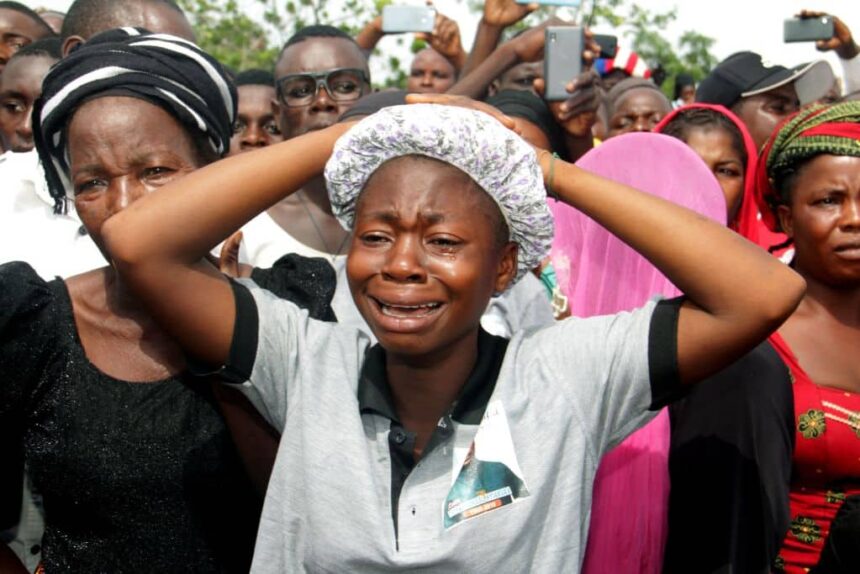NIGERIA – A Catholic-inspired NGO has released a report showing that Jihadist Fulani herdsmen have taken over Christian communities across Nigeria’s South East.
The International Society for Civil Liberties and the Rule of Law, also known as Intersociety, found that these herdsmen and their allies now control at least 950 locations throughout the mostly Christian states of Abia, Enugu, Anambra, and Ebonyi.
Emeka Umeagbalasi, a leading criminologist in Nigeria and the head of Intersociety, said, “Fulani herdsmen have filled every key area in Igbo Land, helped by the Nigerian military.” According to Umeagbalasi, these groups use their bases to target Christians, often kidnapping and killing them.
The group’s research shows these 950 locations are scattered across over 800 communities in the region. About 40 percent of the region’s 1,940 communities are under serious threat from herdsmen and bandits.
“According to our findings, the South East has 1,940 Igbo Christian communities: 771 in Abia, 700 in Imo, 190 in Enugu, 183 in Anambra, and 96 in Ebonyi. All within a land area of 29,525 square kilometres,” the report says.
The number of locations controlled by Jihadist Fulani groups has grown quickly. In 2015, only about 10 locations were under their control. By August 2019, that number had jumped to 139.
The report goes on to say that by early 2020, there were 350 such locations. By April 2021, that number doubled to 700, including areas in Igbo parts of Delta, Edo, Kogi, Benue, Nasarawa, Rivers, and Cross River.
Muslims Stealing Christians’ Lands
The report explains that Muslim Fulani herdsmen have taken over communal lands, forests, and farm settlements. They also use ancient sacred forests as hideouts for their activities. Much of this activity happens at night, and security forces are often aware, the report claims.
The report also points out that many people from affected communities, especially those living abroad, do not know their ancestral lands have been taken. It alleges that state ministries issue certificates of occupancy, giving these lands to the Fulani groups.
Once this paperwork is done, the land gets quietly connected to the Northern Islamic leadership, with a new Fulani leader appointed and placed in charge.
The report accuses some traditional leaders and government officials of helping the jihadist groups get land.
“Some Fulanis moved into these areas because community leaders and state governments got involved, giving out certificates of occupancy and promising political gains,” the report adds.
Umeagbalasi claims all the governors in the South East zone have played a role in this, making it easier for the herdsmen to access land.
He believes this is why the governors do not speak out or take action against the violence by Fulani herdsmen. “They refuse to act as the Chief Security Officers of their states,” he said.
An earlier report by Intersociety recorded that over 20,300 Christians had been killed in the South East since 2015. The killers included Jihadist Fulani herdsmen, Niger Delta militants, Fulani bandits, Fulani Muslim vigilantes, and even the Nigerian military.
“It’s heartbreaking that innocent people are killed every day simply because they are Christians,” Umeagbalasi told Crux.
He said that while the killings continue, security forces often look the other way. He claims there is more protection for Fulani cattle than for people, with herdsmen enjoying round-the-clock state security for their livestock while Christians are left at risk.
“This is very sad,” he added.
Umeagbalasi also criticized government officials and Catholic bishops, accusing them of staying silent.
Nigeria’s jihadist violence
Since 2009, Nigeria has struggled with jihadist violence. Boko Haram, seeking to create a caliphate, sparked years of unrest, followed by the rise of other terror groups like ISWAP and jihadist Fulani herdsmen.
The Muslim Fulani herdsmen are a subset of the Fulani (also known as Fula or Fulbe), a large ethnic group spread across West and Central Africa, with a significant population in Nigeria. The Fulani are one of the largest nomadic pastoralist groups in the world, with an estimated 25–40 million people, primarily Muslim, though not all practice Islam actively.
Some Fulani herdsmen have been linked to violent attacks, particularly in Nigeria’s Middle Belt, targeting farming communities. These attacks have involved killings, destruction of villages, and churches, with reports of thousands of deaths since the early 2000s.
Some sources suggest affiliations with jihadist groups like Boko Haram, who may arm young Fulani men, framing disputes as religious conflicts. However, not all Fulani herdsmen are involved in violence; many are peaceful pastoralists, and the group is not a centralized militia with a unified agenda.
Source: The Catholic Herald







